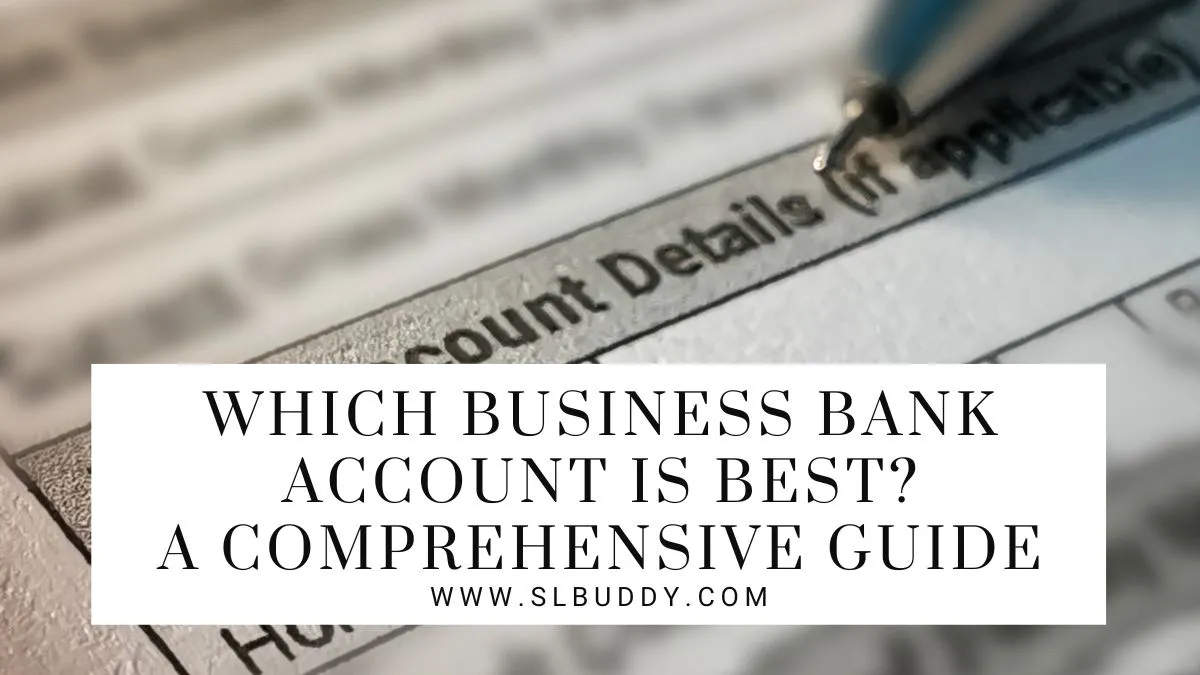
Choosing the right business bank account is not just a financial decision; it’s a strategic one. The account you choose will determine how you manage your funds, how you make payments, and even how you receive payments from clients.
It’s a foundational aspect of your business operations. Moreover, the right bank can offer more than just a place to store your money.
It can provide valuable financial advice, tools to manage your cash flow, and even opportunities for loans and credit.
The decision becomes even more critical when you consider the potential pitfalls of choosing the wrong bank.
Hidden fees, poor customer service, and lack of essential features can not only be a nuisance but can also hinder your business’s growth.
Therefore, it’s essential to approach this decision with the same seriousness and research as other major business decisions.
The Different Types of Business Bank Accounts
Navigating the world of business banking can be daunting, especially with the myriad of account types available. Each type serves a unique purpose, tailored to cater to different operational needs.
From managing daily transactions to facilitating international trade, understanding these accounts is the first step to ensuring efficient financial management for your business.
Checking Accounts: The Backbone of Daily Operations
A business checking account is the workhorse of your financial operations. It’s the account you’ll use most frequently, whether you’re depositing daily sales, paying vendors, or managing other routine transactions.
Given its central role, it’s crucial to choose an account that offers flexibility, low fees, and robust online features.
Furthermore, as your business grows, your transaction volume and average balance might increase, potentially subjecting you to additional fees or pushing you to a different account tier.
It’s essential to understand these thresholds and how they might impact your costs. Some banks also offer interest-bearing checking accounts, which can be an added benefit for businesses that maintain higher balances.
Savings Accounts: Where Your Profits Grow
While a checking account is for daily operations, a business savings account is for future planning.
Whether you’re saving for a significant investment, like new equipment or an expansion, or simply building a financial cushion, a savings account can help your money grow.
The key is to look for accounts with competitive interest rates. Additionally, consider the accessibility of the funds.
Some savings accounts may limit the number of withdrawals you can make each month. While this might not be an issue if you’re setting aside money for long-term goals, it’s something to be aware of, especially if you might need to access the funds more frequently.
Merchant Services Accounts: Making Sales Seamless
If your business sells products or services, especially online, a merchant services account is indispensable.
It allows you to accept credit and debit card payments, making transactions smoother and more professional.
In today’s digital age, customers expect seamless payment options, and not offering them can be a significant disadvantage.
However, it’s essential to be aware of the associated fees. Every time a customer pays with a card, you’ll likely incur a fee.
These fees can vary widely between providers, so it’s crucial to shop around and find the best deal for your transaction volume and average ticket size.
Foreign Currency Accounts: Going Global
As businesses expand their horizons, dealing with international clients and vendors becomes commonplace.
A foreign currency account can be a game-changer in such scenarios. Instead of grappling with exchange rates for every transaction, you can maintain balances in multiple currencies, making international business more straightforward.
Beyond just convenience, these accounts can also offer financial advantages. By holding multiple currencies, you can leverage favorable exchange rates, potentially saving significant amounts over time.
However, it’s essential to be aware of any associated fees and to understand the complexities of managing multiple currencies.
Features to Look for in a Business Bank Account
A business bank account is more than just a repository for your funds; it’s a tool that can streamline operations, safeguard assets, and even drive growth.
However, not all accounts are created equal. Identifying key features that align with your business’s needs can make the difference between simple banking and a strategic financial partnership.
Fee Structures: Avoiding Hidden Charges
Fees can quickly erode your business’s profits. Whether it’s a monthly maintenance fee, transaction fees, or ATM charges, it’s crucial to understand the full cost of your account.
Some banks might offer fee waivers if you maintain a minimum balance or if you make a certain number of transactions each month.
It’s also worth noting that the cheapest option isn’t always the best. An account with slightly higher fees might offer additional features or better customer service that makes the extra cost worthwhile. It’s all about finding the right balance between cost and value.
Online and Mobile Banking: Managing Money on the Move
In today’s fast-paced business world, being able to manage your finances on the go is crucial. Online and mobile banking features allow you to check balances, make transfers, and even deposit checks without visiting a branch.
This convenience can save you time and streamline your financial management. Security is another critical aspect of online and mobile banking.
Ensure that the bank uses robust security measures, like two-factor authentication and encryption, to protect your financial data.
Additionally, check if the bank’s mobile app is user-friendly and has good reviews from other users.
Overdraft Protection: Safeguarding Against Unexpected Shortfalls
Cash flow can be unpredictable, especially for new or seasonal businesses. Overdraft protection can be a safety net, ensuring that you don’t face hefty fees or declined transactions if you accidentally overdraw your account.
It can be especially valuable if you have multiple transactions coming in and out of your account daily.
However, it’s essential to understand the terms. Some banks might offer a grace period before charging overdraft fees, while others might link your checking account to a savings account or credit line to cover any shortfalls.
Always be aware of any associated fees or interest rates.
Additional Perks: From Rewards to Business Tools
Banks often offer additional perks to attract and retain business customers. These can range from cashback rewards for certain transactions to free or discounted access to business tools and software.
For instance, some banks might offer discounted accounting software or free consultations with business advisors.
While these perks can be attractive, it’s essential to ensure that they align with your business needs.
A perk that you won’t use might not be worth choosing a bank with higher fees or fewer essential features.
How Business Size and Type Influence Your Choice
Every business is unique, with its own set of financial requirements and challenges. A startup might prioritize flexibility, while a well-established corporation may seek comprehensive solutions.
Recognizing how the size and nature of a business shape its banking needs is crucial in selecting the most fitting account.
Sole Proprietors: Simple Needs, Simple Solutions
Sole proprietors often have simpler banking needs compared to larger businesses. They might not require advanced features like merchant services or foreign currency accounts.
Instead, they might prioritize low fees, easy online access, and perhaps a relationship manager who can provide personalized advice.
However, even if your needs are simple now, it’s essential to consider future growth. As your business expands, your banking needs might evolve.
Choosing a bank that can grow with you, offering more advanced features when you need them, can save the hassle of switching later on.
Growing Startups: Flexibility and Scalability Matter
Startups operate in a dynamic environment. Their banking needs can change rapidly as they scale.
They might start with a simple checking account but quickly require more advanced features like merchant services, high-volume transaction capabilities, or even business loans and credit.
For startups, flexibility is key. They need a bank that can adapt to their changing needs, offering scalable solutions without excessive fees.
Additionally, startups might benefit from banks that cater specifically to their sector, understanding the unique challenges and opportunities they face.
Established Corporations: Comprehensive Solutions for Complex Needs
Large corporations have a complex web of financial needs. They might operate in multiple countries, deal with vast sums of money, and require a range of financial services from loans to investments. For them, a simple business checking account won’t suffice.
These corporations need a bank that offers a comprehensive suite of services, from foreign currency accounts to corporate credit solutions.
They might also prioritize banks that provide dedicated relationship managers, understanding their business’s intricacies and offering tailored advice.
The Role of Interest Rates
Interest rates, often seen as mere percentages, play a pivotal role in the financial trajectory of a business. They influence everything from the growth of savings to the cost of borrowing.
In a fluctuating economic landscape, understanding and leveraging interest rates can be a strategic move for any business.
How Rates Can Impact Your Business Savings
Interest rates might seem like a minor detail, but they can have a significant impact on your business’s financial health.
A higher interest rate on a savings account can lead to substantial earnings over time, especially if you maintain a high balance.
Conversely, understanding the interest rates on loans or credit can help you manage debt more effectively.
It’s also worth noting that interest rates can be a reflection of broader economic trends. Rising rates might indicate economic growth, while falling rates might signal economic challenges.
Being aware of these trends can help you make informed business decisions.
Comparing Rates: What’s Competitive in Today’s Market?
Just as with personal banking, it’s essential to shop around and compare interest rates. What one bank offers might not be the best available rate.
By comparing rates from multiple banks, you can ensure that you’re getting the best possible return on your savings or the most favorable terms on your loans.
However, it’s essential to consider the whole package. A bank might offer a slightly lower interest rate but charge higher fees or offer fewer features.
Always consider the overall value proposition, not just the interest rate.
The Importance of Customer Service
In the realm of banking, where trust is paramount, customer service emerges as a key differentiator. It’s not just about resolving issues; it’s about building a relationship.
A bank’s responsiveness, accessibility, and genuine commitment to supporting your business can significantly impact your overall banking experience.
In-Person Support: The Value of a Local Branch
In an increasingly digital world, the value of in-person interactions can’t be underestimated. Being able to visit a local branch, speak with a banker face-to-face, and resolve issues or get advice in real-time can be invaluable.
For many business owners, this personal touch can make a significant difference in their banking experience.
Additionally, local branches can offer insights into the local business environment, provide networking opportunities, or even host business events and workshops.
For businesses that value community engagement, a bank with a strong local presence can be a significant asset.
Digital Support: 24/7 Assistance for the Modern Business
While in-person support is valuable, digital support is essential. Whether it’s a question about a transaction, a technical issue with online banking, or a need for advice outside of regular business hours, 24/7 digital support can be a lifeline for busy business owners.
When evaluating a bank’s digital support, consider the range of options available.
Do they offer live chat, email support, and a helpline? Is their response time fast? Do they have a reputation for resolving issues effectively?
These factors can significantly impact your overall banking experience.
Reviews and Testimonials: What Other Business Owners Are Saying
While banks might make a range of promises, reviews and testimonials can provide a more unfiltered view of their actual performance.
Hearing from other business owners can give insights into the bank’s reliability, customer service quality, and even potential pitfalls or challenges.
However, it’s essential to approach reviews with a critical eye. Every business’s needs are unique, and what works for one might not work for another.
Use reviews as a data point, but always consider your specific requirements and priorities.
Transitioning Between Bank Accounts
Change is a constant in the business world, and there may come a time when your current bank account no longer aligns with your needs.
Transitioning to a new account, while potentially beneficial, requires careful planning. It’s a move that can set the stage for future financial success, but only if executed seamlessly.
When and Why to Consider Switching
Loyalty is valuable, but there might come a time when your current bank no longer meets your needs.
Whether it’s due to excessive fees, lack of necessary features, or poor customer service, there are valid reasons to consider switching banks.
However, it’s essential to weigh the pros and cons. While a new bank might offer better terms, the process of switching can be time-consuming and complex.
Before making the decision to switch, consider speaking with your current bank. They might be willing to offer better terms or address any issues to retain your business.
If not, ensure that you’re fully informed about the benefits of the new bank before making the move.
Steps to Ensure a Smooth Transition
Switching banks can be daunting, but with careful planning, it can be a smooth process. Start by opening the new account and ensuring it’s fully functional before closing the old one.
Inform all stakeholders, from clients to vendors, about the change. Update any automatic payments or direct deposits to the new account.
And always ensure that all pending transactions have cleared before closing the old account.
Additionally, consider any potential fees or penalties for closing your old account. Some banks might charge if you close an account within a certain period after opening it.
Being aware of these charges can help you avoid any unexpected costs.
FAQs
Navigating the intricacies of business banking can be a complex endeavor. With various account types, features, and considerations based on business size and nature, making informed decisions is paramount.
To help clarify some of the key points from the article, we’ve compiled a set of questions and answers that delve into the essentials of business banking.
What are some of the primary types of business bank accounts mentioned in the article?
The article mentions several types of business bank accounts, including checking accounts for daily operations, savings accounts for profit growth, merchant services accounts for seamless sales, and foreign currency accounts for international business dealings.
Why is it essential to scrutinize the features of a business bank account?
Scrutinizing the features of a business bank account is crucial because it ensures that the account aligns with the specific needs of the business. The right features can streamline operations, safeguard assets, and even provide opportunities for growth, making the account a strategic financial partner.
How does the size and nature of a business influence its banking requirements?
The size and nature of a business play a significant role in its banking needs. For instance, startups might prioritize flexibility and scalability, while established corporations may require more comprehensive solutions. Recognizing these specific needs ensures that the chosen bank account is the most fitting for the business.
In the context of business banking, why are interest rates considered pivotal?
Interest rates are pivotal in business banking because they directly impact the financial growth and borrowing costs of a business. They influence the returns on savings and the expenses on loans, making them a strategic consideration in any financial decision.
Why is customer service highlighted as a key differentiator in banking?
Customer service is a key differentiator in banking because it’s about building trust and a strong relationship with the bank. Effective customer service ensures prompt issue resolution, provides valuable insights, and fosters a sense of partnership, enhancing the overall banking experience for businesses.
Don’t miss: Best Payment System for Small Business
The bottom line
In the world of business, financial decisions are among the most critical. The bank you choose can play a pivotal role in your business’s success, offering not just financial services but also advice, support, and even opportunities for growth.
By understanding the different types of accounts, assessing essential features, and considering your business’s unique needs, you can make an informed choice that sets your business up for financial success.
As with all business decisions, it’s essential to revisit your banking choice periodically, ensuring that it continues to meet your needs as your business evolves.










